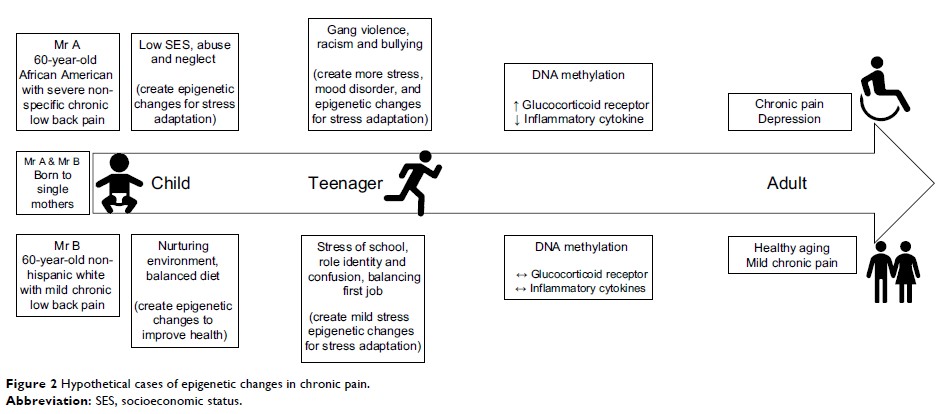9 0 6 7 6
论文已发表
注册即可获取德孚的最新动态
IF 收录期刊
- 2.6 Breast Cancer (Dove Med Press)
- 3.9 Clin Epidemiol
- 3.3 Cancer Manag Res
- 3.9 Infect Drug Resist
- 3.6 Clin Interv Aging
- 4.8 Drug Des Dev Ther
- 2.8 Int J Chronic Obstr
- 8.0 Int J Nanomed
- 2.3 Int J Women's Health
- 3.2 Neuropsych Dis Treat
- 4.0 OncoTargets Ther
- 2.2 Patient Prefer Adher
- 2.8 Ther Clin Risk Manag
- 2.7 J Pain Res
- 3.3 Diabet Metab Synd Ob
- 4.3 Psychol Res Behav Ma
- 3.4 Nat Sci Sleep
- 1.9 Pharmgenomics Pers Med
- 3.5 Risk Manag Healthc Policy
- 4.5 J Inflamm Res
- 2.3 Int J Gen Med
- 4.1 J Hepatocell Carcinoma
- 3.2 J Asthma Allergy
- 2.3 Clin Cosmet Investig Dermatol
- 3.3 J Multidiscip Healthc

Could epigenetics help explain racial disparities in chronic pain?
Authors Aroke EN, Joseph PV, Roy A, Overstreet DS, Tollefsbol TO, Vance DE, Goodin BR
Received 23 October 2018
Accepted for publication 4 January 2019
Published 18 February 2019 Volume 2019:12 Pages 701—710
DOI https://doi.org/10.2147/JPR.S191848
Checked for plagiarism Yes
Review by Single-blind
Peer reviewers approved by Dr Colin Mak
Peer reviewer comments 2
Editor who approved publication: Dr Katherine Hanlon
Abstract: African
Americans disproportionately suffer more severe and debilitating morbidity from
chronic pain than do non-Hispanic Whites. These differences may arise from
differential exposure to psychosocial and environmental factors such as adverse
childhood experiences, racial discrimination, low socioeconomic status, and
depression, all of which have been associated with chronic stress and chronic
pain. Race, as a social construct, makes it such that African Americans are
more likely to experience different early life conditions, which may induce
epigenetic changes that sustain racial differences in chronic pain. Epigenetics
is one mechanism by which environmental factors such as childhood stress,
racial discrimination, economic hardship, and depression can affect gene
expression without altering the underlying genetic sequence. This article
provides a narrative review of the literature on epigenetics as a mechanism by
which differential environmental exposure could explain racial differences in
chronic pain. Most studies of epigenetic changes in chronic pain examine DNA
methylation. DNA methylation is altered in the glucocorticoid (stress response)
receptor gene, NR3C1 , which has been associated with depression,
childhood stress, low socioeconomic status, and chronic pain. Similarly, DNA
methylation patterns of immune cytokine genes have been associated with chronic
stress states. Thus, DNA methylation changes may play an essential role in the
epigenetic modulation of chronic pain in different races with a higher
incidence of epigenetic alterations contributing to more severe and disabling
chronic pain in African Americans.
Keywords: chronic
pain, epigenetics, racial health disparities, epigenomics, DNA methylation,
stress
